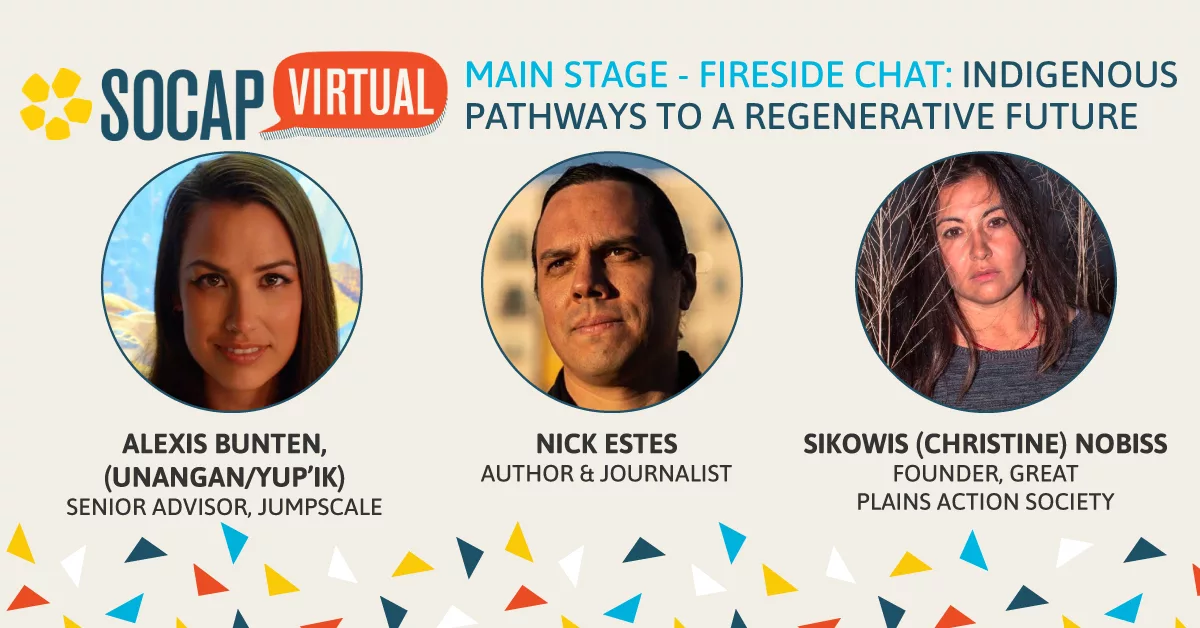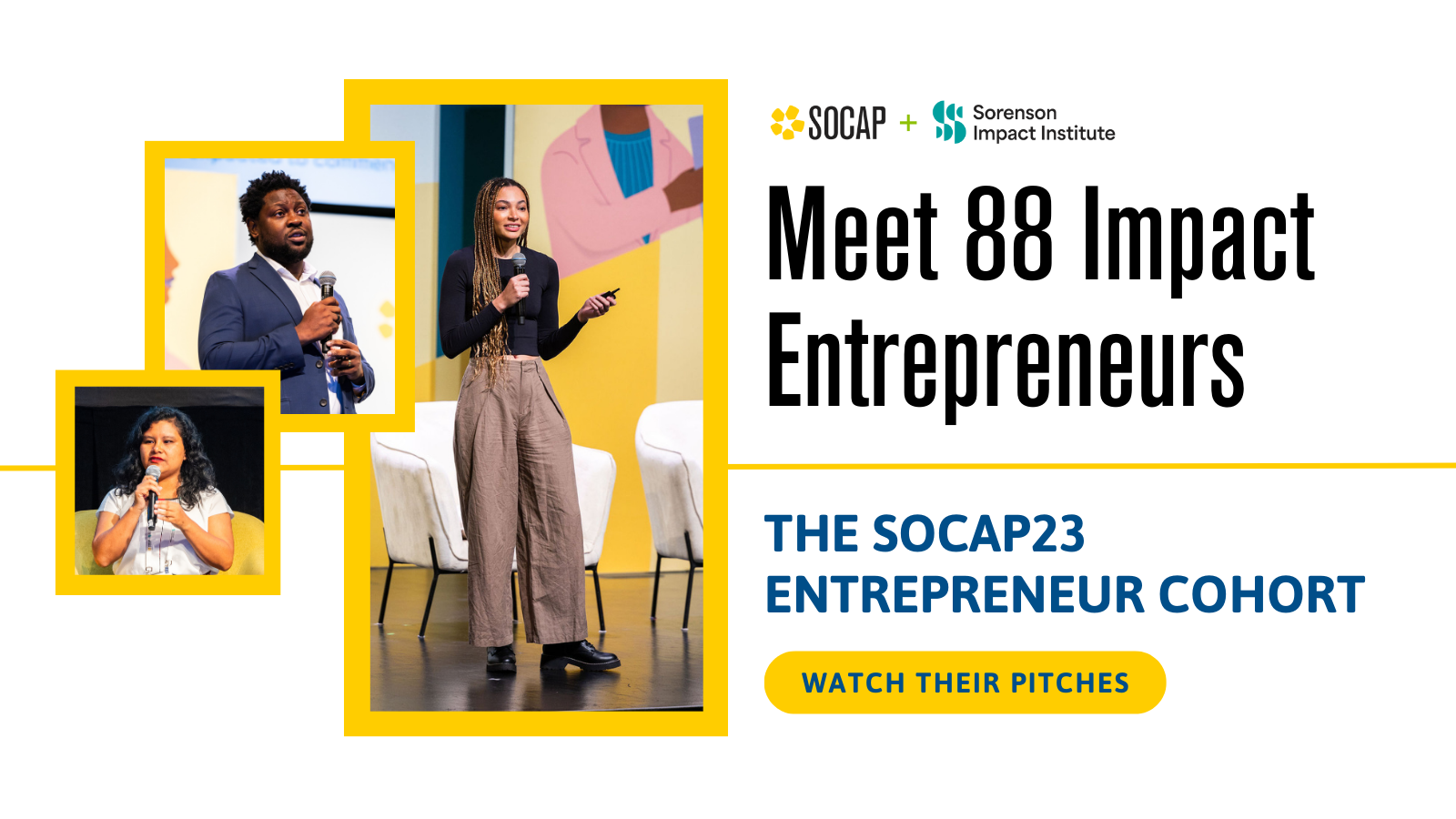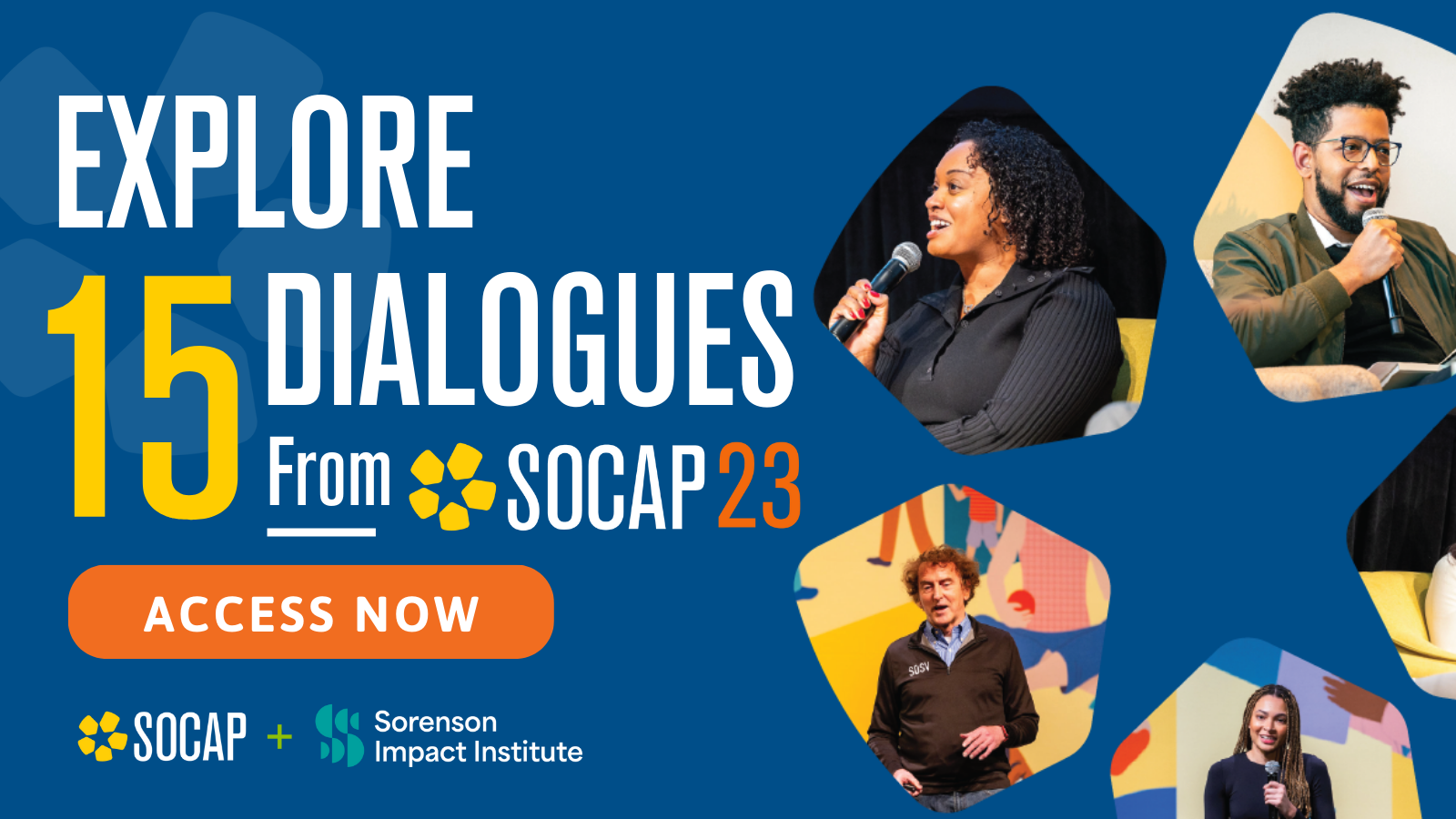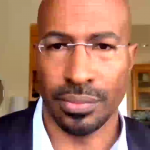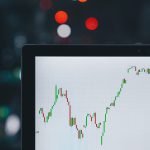Indigenous Pathways to an Equitable, Regenerative Future
Indigenous Peoples already do “green jobs” and currently protect 80% of the world’s biodiversity. Sikowis, Nick Estes, and Alexis Bunten discuss colonial-capitalism and how Indigenous-led strategies offer a pathway towards an equitable and regenerative future. However, we need to uplift movements and stories inspired by Indigenous resistance by changing the mechanisms that fund this work. To do this, we must change the culture of philanthropy and impact investing, which still largely circulates in privileged circles.
“What we’re seeing is Indigenous led organizations are making the greatest innovations while proving ROI, while redefining impact to include nature, ecosystems, and ethics,” says Alexis Bunten. Bunten joins Nick Estes and Sikowis in this Fireside Chat originally held at SOCAP Virtual 20.
The panel covers ways to reach a regenerative economy, one that takes us away from colonial-capitalism, which relies on forceful acquisition, extraction, privatization, and a permanent underclass all enforced by policy and laws. The Indigenous-led strategies discussed in this fireside chat are centered around a regenerative economy that Indigenous Peoples have been leading already today.
Watch the full session or read the transcript of the conversation below to learn more about how to bring about such a regenerative economy.
Watch Indigenous Pathways to a Regenerative Future
Christine Nobiss: Hello and good afternoon. My name is Sikowis, also Christine Nobiss, and I’m Plains Cree Saulteaux of the George Gordon Forestation and a decolonizer with Great Plains Action Society. And I’m very honored today to be introducing Alexis Bunten and Nick Estes along with myself for a Fireside Chat concerning colonial capitalism and a pathway towards a better future. Alexis. Welcome.
Alexis Bunten: Thank you, Christine. So I’m going to spend about the next couple of minutes talking about how Indigenous peoples are leading us out of the mess that capitalism is right now. But I want to start by establishing my authority on this subject. Again, like Christine said, my name is Alexis Bunten. And my authority starts from being born as an Alaska native woman. My tribes are Unangan and Yu’Pik from Bristol Bay, Alaska. And I’ve worked for tribal businesses, native corporations, consulted for them, and wrote a Ph.D. on the subject. I’ve taught economics and I currently co-direct the Indigeneity program for Bioneers and serve as a senior advisor with JumpScale. So right now what we’re seeing is Indigenous led organizations are making the greatest innovations while proving ROI, while redefining impact to include nature, ecosystems, and ethics.
So just a few examples of these is BCG crypto is using blockchain technology. Right now one of the tribes their working with is one of the first to be approved by the SCC to develop and register a security in the U.S. And one of the things that they’ve worked into trading through the blockchain is making sure that nature has a place at the table and that nature is a shareholder in the way that they use blockchains. Yego coffee has completely indigenized their supply chain, which gives more returns back to the people who roast the coffee. Lubicon Solar has built renewable energy in the middle of the tar sands while providing employment and fighting climate change. Hope Nation Consulting focuses on women’s leadership. And while they do their business consulting, they’re also addressing underlying colonial genocidal trauma. You cannot do one without the other. And my own native corporation, Bristol Bay Native Corporation, is dedicated to the fishing way of life first, fish first.
And we have consistently led the fight against Pebble Mine, which is back on the table now, which would be the largest open-pit copper mine in the continent. And we’re still we’re opposing that mining, but we are still having record returns year after year. So I want to say, first of all, I want to dispel our audience of the idea that Indigenous Peoples can’t be capitalists, that we can’t be business leaders, and that we can’t be extremely successful. And the innovators that everybody else looks to for new ways out of this mess that I started with. So I argue that we can be, but it’s more of an Indigenous capitalism. And if you want to learn more about that, you can read the 2011 article I wrote on this called “Indigenous Capitalism.” And I want to define for a minute what colonial capitalism is because this is in the title of this talk, of this Fireside Chat today.
And I would say it’s part and parcel of this larger definition of capitalism. Colonialism and capitalism are essentially the same thing and we can use the U.S. as an example of this. So, for example, it requires colonization, which if you don’t know the definition, it’s basically when a group of people take land by force from another group to permanently live there and control resources. And that force in America means genocide that’s ongoing now. It involves privatization. It involves the establishment of needy groups of people. If any of you are economic theorists talking about dependency theory. Having an underclass or people that you permanently make poor or here we use racism, of course, and structural inequality. It requires partnership with the nation state to make and enforce laws that protect privatization, exploitation, natural resource extraction, and intergenerational concentration of capital. It requires resources taken from stolen land and it requires perpetual warfare.
And one interesting fact about the United States is since the country’s inception in 1776, we’ve been at war for 225 of the 240 years that this nation has been around. So some scholars talk about post-capitalism or late stages of capitalism. I don’t know if capitalism is going to go away. It probably will. Marx certainly thought it would and many of our Indigenous leaders and culture bearers believe it will. I’ve been told that my whole life. But while we are still in this system and transitioning out of it to a more regenerative world, our Indigenous led businesses are really practicing this sort of Indigenous capitalism. And I’ll just take about 60 more seconds here. One of the features of this Indigenous capitalism, this new way out, is to incorporate Indigenous worldviews and values into your business ethos, thoughts, mission, and practice and to keep checking it.
So some values may include respect, reciprocity, giving back, and honoring relationship first. So how non-native organizations can get this, can get what we are leading the way in is just I just want to leave you with a few practical tips. One might be revise your mission to make it truly values-driven first. Get Indigenous people on the board or at least diversify your board to 50% or more. Put nature on the board. Hire Indigenous consultants. Decolonize your organizational practices. This thing that I call organizational or institutional decolonization, this is something that I’ve been working on for the last few years and I’ve already done it with an organization to great results.
Decolonize your wealth.
Alexis Bunten
Check out Edgar Villanova’s book called Decolonizing Wealth. Some ways to do that, divest all your business activity from fossil fuels in all ways, including the banks you use like Wells Fargo, invest in portfolios that consider a quadruple bottom line, not just people, planet, and profit, but also spirit or wellbeing. So learn about and adopt this quadruple bottom line. So I’m going to stop there. I think I’ve taken up enough time and queue it up for Nick.
Nick Estes: That’s a traditional Lakota greeting that says, “I greet everyone with a handshake and an open heart.” And I’m happy to be here. This is a little bit out of my own comfort zone as far as talking about these kinds of things. But nonetheless, I think it’s an important perspective that I’m going to try to offer. And I’m going to talk a little bit today about organization, The Red Nation, and some of the projects we’re working on. We were founded in 2014. We have over 100 different members from different Indigenous nations who are multinational in that sense that are even outside of the United States. We’re anti-capitalist and anti-colonial. We’re also connected with many different global Indigenous organizations. Some of them have kind of formal recognition at the United Nations. Other are more social-movement based, especially in Latin America like places like Bolivia, Brazil, Ecuador, and Venezuela.
But we also center direct action and mobilization in education as part of our primary kind of orientation towards our politics. And we were at first based out of Albuquerque, New Mexico, and we saw this kind of growing need amongst Indigenous people in the city to access to housing and access to healthcare specifically, but also to combat police violence and that’s really where we were founded and where we do a lot of our work within our community here. And since then we’ve expanded. So today I just a call and this is going to be a week from now, but today I got a call about a 10-city occupation that was set up by Indigenous people in He Sapa, the Black Hills. We have comrades and relatives there from Red Nation who are on the ground and helping organize with that.
So we have quite an extensive reach. We have been doing what we call the “no dead natives” campaign, which is #Indian, since 2015, to combat exposure deaths in border towns, specifically the white-dominated settlements around Indian reservations that basically exploit Indigenous life. We started in Gallup, New Mexico, which has the highest percentage of Indigenous people per capita for an urban population. They’re almost half of the population. Have zero representation in the city, but nonetheless feed the city’s economy, whether it’s through Wal-Mart payday loan lending or through any kinds of things such as car dealerships and things like that.
[
We’re currently working on a land-back campaign here in the city, thinking about Indigenous spaces in the city as part of Indigenous territories and never having been formerly seated. And so what we’ve been doing, without a lot of capital investment, but just based on our own membership dues and volunteer labor that we’ve kind of cobbled together and organized is we’ve created a food sovereignty program to reconnect Indigenous youth with the land and with traditional foods and that goes into our outreach campaign.
Every week we feed relatives who are on the street, low-income relatives, it doesn’t matter. By relative mean Indigenous and non-Indigenous people who may be in need, and we’ve expanded those services in the time of COVID because in a place like New Mexico, whichhas the highest rate of childhood hunger. And so we’re combating that, not just by giving out canned food or starchy foods or unhealthy foods, but trying to reconnect people with Indigenous foods and saying like, “Look. This is a viable alternative that you can grow right here in the city.” And our final thing that we’re working on is Red Media. So we actually formed The Red Nation as a media outlet and a media collective. But we turned into a movement instead, which is actually much more beneficial. So we were a movement before we became a media project, but we have four principles.
The first is Indigenousness as a way of relating, which transcends the kind of confines of the nation state, especially southern colonialism. We have another one that says by any media necessary. We do media like formal journalism, podcasting, but also we do a lot of infographics with our social media campaigns. The third principle is that we are not a minority.
Oftentimes Indigenous people get cast as a minority within a larger settler system, but we are the majority of this hemisphere and so we have to behave and act like that.
Nick Estes
And then the fourth principle is kill the capitalist in your head. And what we mean by that is that we’re not here to make a profit. We’re not here to sell our writing or our products as something that can be bought and consumed. We believe in producing confidence through the stories and through the media that we produce and through our direct action campaigns that things can and will change if we are organized, not just as Indigenous nations, but non-Indigenous people as well. And so we believe decolonization is not only an Indigenous problem, it’s everybody’s problem. And specifically on a global scale, the way that we’re going with climate change, it’s decolonization or extinction.
Christine Nobiss: That was great. YThank you for turning it over to me. It’s nice to be back at SOCAP this time a speaker on a main stage, I’ve actually spearheaded Indigenous sessions at SOCAP for two years in a row. So this has been a real passion of mine because also of my beliefs in what colonial capitalism is and what it’s doing to our world. As I said earlier, I’m a decolonizer with Great Plains Action Society. We are Indigenous folks of the Great Plains working to resist colonial capitalist institutions and indigenize the world. And to start, I actually referred back to a talk I did last year at Bioneers today and saw a quote that I stated at that talk by a Peu-Peu-Mox-Mox, who was a Walla Walla chief.
And he said, “Goods and the Earth are not equal. Goods are for using on the Earth. You cannot give goods in exchange for land.” The capitalist idea of exchanging lands for goods was a completely foreign concept to Indigenous peoples before colonization and genocide occurred on these lands. And so this quote is at the foundation of everything I do because I believe, and I know, that capitalism is intrinsically linked, tied to colonialism. They are one in the same, essentially, as Alexis and Nick have just stated. So I don’t really have to go into the details of that because you already did that for me. So thank you. So I don’t ever use these terms separately. I always use them together and I would even add Christianity into that as well, which is actually the foundation of all of this. But I’m here today to talk about philanthropy and about where SOCAP is headed.
And I know that one of the taglines of SOCAP is where money meets meaning. And I do know that last year one of the original founders gave a talk about that, that maybe perhaps the meaning of SOCAP has left somewhat the space. And I want to talk about philanthropy rather than impact investing or social capitalism right now. As I think these concepts, as they’re actually practiced, are still just a form of capitalism that is still perpetuating colonialism, because in the end Indigenous communities are still the first to be extracted from and the last to be resourced, regardless of whether or not people right now are trying to change how they do capitalism, because in the end capitalism is still capitalism and still colonialism in my opinion. And this is because the green capitalist economy is fundamentally still flawed in its understanding of how profit should be understood.
So, what is profit? How do we understand what profit is? What is the meaning of profit? And I think that no matter how you look at it with capitalism, it’s always a sole entity gaining margins of something. So if we want to elevate Indigenous ways of being in this world to combat colonial capitalism, there needs to be a reckoning with the fact that money, profit, if you will, in the investment world, in the political world, and in the philanthropic world, still cycles in white privilege circles. So like the majority of philanthropic funding right now goes primarily to white-led organizations, which of course is still perpetuating injustice. There was a study done by the First Nations Development Institute between 2006 and 2014 where they found that the total share of all foundation funds going toward Native American-led organizations and Native American causes was only 0.6% of the total.
There’s another study that was done by Stanford Social Innovation Review, where they saw that out of the $60 billion in U.S. foundation funding each year, 95% of it goes to white-led organizations.
Christine Nobiss
So this is happening in the philanthropic world where, in fact, it should be the opposite. What’s happening in the impact investing world, for instance? I would say that this is a relevant statistic and that it would tell us that across the board in not just the philanthropic world, but in the political and in the impact investing world, we probably still are having the same issues. And this is important because at this particular moment, just before one of the most contentious presidential elections in U.S. history, this issue could not be more apparent.
Because as Indigenous communities are facing COVID and all sorts of other issues, we are left even more disenfranchised right now at the polls due to lack of funding and a want to actually uplift people’s voices and values, even in the political realm. And even though we have grown 35% while the rest of the population has grown 14% from 2000 to 2016, we’re not being seen still. And so what I’ve said to some, I guess you would say heavy hitters in the political world, is you all have to stop putting money towards the status quo. You’re still putting money towards white populations that you think are going to get out the vote.
And right now there’s only a handful of Indigenous led 501(c)(4) in the country. Great Plains Action Society is one of them that can really make that precarious link between nonprofit community organizing and real political change, which is a difficult thing to do. So I just want to say that we need to understand that in the end, the idea of social impact investing is still, I think, very much a capitalist endeavor and people need to start understanding that money needs to flow in a different direction first so that we can allow people to get to those levels where they can start creating a better economy, an Indigenous led regenerative economy for a better compassionate world.
Nick Estes: Just listening to both of you talk, the wheels were kind of spinning in my head when you said, Christine, that 95% of this funding goes to white orgs. 95% of privately owned land in this country is owned by white people. And if you think about South Africa under apartheid, white people made between five to 7% of the population, but own 70% of the land. And so there’s a direct translation between who owns the land, has the wealth. And then the other thing was that it’s not just about voting and I think this is what we’re trying to do with The Red Nation. It’s one of the most contentious presidential elections in U.S. history, but it’s also the one that has the least alternatives for a way out of this mess.
And so part of this is we’re actually trying to build an alternative. And I learned this from my friends in the global South that you can go to the polls, but if you don’t know how to plant your own food, if you don’t know how to grow your own food, then what are you really doing? Are you feeding people? And so this is what we’re trying to put into practice. And I know both of you are trying to do this as well because we’re not just out here making demands, we’re actually trying to build something. And that is part of that transition away from capitalism to a more just and sustainable society.
Alexis Bunten: Well I just wanted to offer a couple takeaways from things that I heard both of you say. My snapping fingers are sore now. Thanks a lot. But just some takeaways I have. We could probably do this for another hour, but mine are A, capitalism is insanity. We’re killing ourselves and the planet and the planet will survive, our species won’t. Another way it’s insane is it’s reliant on the “red queen” hypothesis, which is constant growth. If you’ve ever read Alice in Wonderland, Through the Looking Glass, the red queen just keeps running and running and running and running to stay in the same place. That’s crazy. Everyone needs to decolonize. All three of us hit on that, in multiple ways. I really picked up on Christine, you saying that Indigenous peoples are the last to be resourced.
Capitalism is wholly dependent on exploitation, whether it be of natural resources or people.
Alexis Bunten
And I was just thinking the other day about how Indigenous peoples in the U.S. were the first to be enslaved. But what many people don’t know is that the Unangan people living on St. George and St. Paul Island and the Pribilofs in Alaska were legally enslaved by the U.S. government well into the 1960’s. And that kind of information needs to be put out there. This is why we need that media voice. I also picked up on Christine and Nick saying how the green economy is still flawed. It is. It needs that quadruple bottom line and we do need to redefine impact. And finally about philanthropy. Oftentimes, well-intentioned philanthropists who get really excited about Indigeneity, they’re only skimming the surface. They get really excited about spiritualism, really, and I think of them as spiritual tourists, but not actual movements. So I really want to encourage people to go to what’s authentic and real, which is like the Great Plains Action Society and what Red Nation is doing.
Christine Nobiss: Yeah. And I think the bottom line is that colonial capitalism is the antithesis to Indigenous ideologies and methodologies, which is why Indigenous folks around the world have been genocided and colonized because the colonizers could not have this opposite ideology when they are taking land and the resources. And so we do need to absolutely change our mindset. That is where we need to be. We need to change the mindset of the world in order to overcome this climate crisis or to combat it in any way whatsoever.
Nick Estes: Yeah. Just a really quick comment to build off of that is that it’s Indigenous Peoples who caretake around a quarter of land-based environments. And with that they’re protecting air that we all need to breathe, whether it’s through the forest or these carbon sinks such as the Great Plains. But also Indigenous people are then criminalized for protecting those landscapes, including water with the Keystone XL pipeline and things that they’re trying to build through our territory, the Dakota access pipeline and the slew of legislation that they have passed to criminalize us.
It shows that we represent a real threat because we actually represent a real alternative. Otherwise they wouldn’t be investing so much money and be so well-organized and we have to be more organized. We’re going against one of the largest, most destructive forces in history. And we have to be 10 times as organized and thinking not just about, “Oh next year about our funding.” We have to be planning 50 years in advance and 100 years in advance. And that’s where we’re at right now. We’re at the beginning stages of planning that.
Christine Nobiss: So thank you so much, Nick and Alexis and I hope everybody out there understands more about decolonizing and combating colonial capitalism with Indigenous economies and politics and ways of being in this world.
